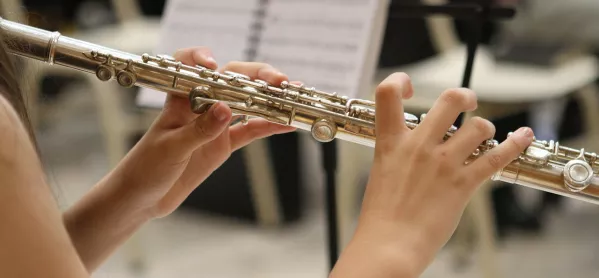- Home
- Exclusive: One bid for model music contract after DfE gave just 8-days’ notice
Exclusive: One bid for model music contract after DfE gave just 8-days’ notice

Just three organisations were approached by the Department for Education to bid for the contract to draft a model music curriculum - and given only week to come up with their plan, Tes can reveal.
The Associated Board of the Royal Schools of Music (ABRSM) was awarded the contract in February after putting in a bid for £4,500. The other two organisations approached, the Incorporated Society of Musicians (ISM) and Music Mark, both subject associations, chose not to bid.
Analysis: ‘The very existence of music in schools is under threat’
EBacc: MPs call for EBacc to include arts to boost live music ‘talent pipeline’
Exclusive: Music curriculum plans ‘deeply concerning’
The government has said the model music curriculum, due to be published in the summer term, will ensure all pupils can benefit from knowledge-rich and diverse lessons and provide schools with a “sequenced and structured template curriculum”. It is designed to be complementary to the national curriculum.
But the decision to develop a supplementary model curriculum has been described as “deeply concerning” by dozens of experts in music education, who are concerned that the DfE expert panel leading the project does not include people with sufficient knowledge of teaching music in schools.
And there was similar concern over ABRSM being given the contract to draft the curriculum - with critics questioning what experience the organisation, which is known for its graded music exams, had of grass-roots level teaching in schools.
Now Tes has learned through freedom of information requests that the three organisations contacted about bidding to draft the curriculum, were approached on 14 January and given a deadline of 22 January.
A spokesperson for ISM said that there were many reasons for not bidding “including the nature of the process itself and the shortness of the consultation period for putting together the new model music curriculum.
“However, the most significant reason is the ISM’s view that the decline in music in our schools is not due to the national curriculum. Rather...the key reasons for the decline in music in our schools are headline accountability measures such as the EBacc and Progress 8 and the fact that most secondary schools are no longer obliged to follow the national curriculum because they are academies.”
The DfE’s decision to publish a model music curriculum for pupils aged 5 to 14 was announced on 11 January.
A spokesperson for Music Mark said it felt that drafting the contract: “would pose a conflict of interest seeing as Music Mark’s CEO Bridget Whyte is on the DfE’s expert panel, which was formed to consult on the model curriculum. Music Mark also doesn’t have the capacity in terms of staff to draft a model music curriculum.”
As Michael Elliott, chief executive of the ABRSM, is on the expert panel, along with Professor Linda Merrick, who is a member of the ABRSM governing body, the ABRSM has included a legally binding “compliance regime” in its tender to say how it will ensure that the organisation does not profit from an unfair advantage over its competitors.
The document says neither Mr Elliott or Professor Merrick were involved in preparing the bid and the bid team have been told that colluding with any member of the expert panel in order to given ABRSM an unfair advantage is a disciplinary offence.
The ABRSM has also declared that it will not share information that could be commercially advantageous with its commercial or publishing teams.
In its tender document, the ABRSM said that through its research and engagement with the teaching community it has “insight into the reality of school-based music education and in responding to the needs of teachers and learners”.
The government also asked bidders to demonstrate that they had “an understanding of the importance of a knowledge-rich curriculum”, to which the ABRSM said that its resource Classical 100 demonstrated its commitment to a “knowledge-rich and immersive approach to music learning”.
When asked how it would demonstrate it had the capacity to develop the curriculum to be ready for publication by May/June 2019, the ABRSM’s tender stated it had “already progressed some of the required work”.
Jonathan Savage, a music education expert and reader in education at Manchester Metropolitan University, said he felt there was some “naivety” in the DfE’s view that the ABRSM could write a curriculum, that it could be badged as a model music curriculum and this would have a “huge impact” on children’s music education.
“It’s not necessarily what primary schools need,” he said. “What we need is a proper invested approach to teachers’ professional development. Just giving teachers a curriculum that someone else has written and asking them to do that is not going to solve the problems in music education.
“The whole idea is flawed. What they should have done is gone to organisations working with primary schools who have written curricula already and looked at upscaling those.”
The ABRSM and the DfE have been contacted for comment.
Keep reading for just £1 per month
You've reached your limit of free articles this month. Subscribe for £1 per month for three months and get:
- Unlimited access to all Tes magazine content
- Exclusive subscriber-only stories
- Award-winning email newsletters



